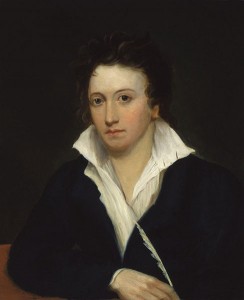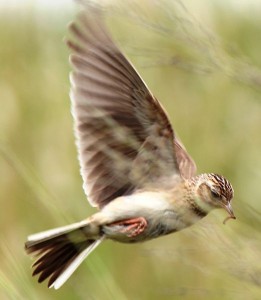I entered three poems for the Rialto/RSPB poetry competition but, not surprisingly, none of them won a prize.
I’ve always liked Shelley, red Shelley, for his lyricism but also for being a campaigner and an angry one at that. If he were back with us he might (or might not) write this:
Not so blithe these days

Bird you’ve always been
That o’er mead or wheat field
Sings on high, unseen.
Robert, Will’am, Alfred
Would’ve known you well;
Carol Ann and Andrew
Still hearken to your tale.
Alauda now is quieter,
arvensis? Not each one.
Plummets now your index,
As you, when song is done.
Tougher still and tougher
Ever is your dance,
Pesticides and silage
Give you little chance.
Lower still and lower
Does your own graph fall
Facts are there abounding
But who will hear your call?
Cockle, flower and bunting,
Harvest mouse and hare,
From on high you watch them
Diminish everywhere.

Symbol of our greed;
Much reduced songster
Singing of your need.
Feed the world! says Peter.
More for less! cries Jim.
No-one heeds the skylark,
Never mind to him.
Strasbourg mouths do chatter,
Brussels ears are deaf,
Who will hear this songster
Bird at its last breath?
Hail to thee red Shelley!
You can see the trap,
Hurry back to haunt them
‘Til they reform the CAP
Notes: Peter is just a random name for a farmer; Jim is just a random name for a(n ex-) Defra Minister; Robert, Will’am, Alfred, Andrew and Carol Ann are all Poets Laureate; cockle, flower and bunting are examples of farmland wildlife that all can be preceded with ‘corn’; the CAP is the Common Agricultural Policy.
[registration_form]
Labour’s Final Solution
The dark eleventh hour
Draws on and sees us sold
For every evil power
We fight against of old.
Jealousy, class and hate,
Oppression wrong and greed
Are loosed to rule our fate,
By New Labour’s act and deed.
The faith in which we stand
The laws we made and guard
Our honour, lives and land
Are given for reward
To thieving hands by night,
To rambler’s boots by day,
To folly, sloth and spite,
And we are thrust away
The blood our fathers spilt
Our love, our toils our pains,
Are counted as for guilt,
And only bind our chains.
Before the country’s eyes,
The traitor claims his price.
What need of further lies?
We are the sacrifice.
The terror, threats and dread
In market, heath and field –
We know when all is all is said
We perish if we yield.
Believe we dare not boast
One Law, one Land, one Throne
We stand to pay the price
We shall not fall alone
Based on Rudyard Kipling’s ‘Ulster 1912’ – written in response to the then government’s creation of the Parliament Act – re-worded by Peter Brady (2004) in response to New Labour’s use of same Act.
and the last few verses from John Clare’s ode to the Skylark, as added contrast..
As free from danger as the heavens are free
From pain and toil, there would they build and be,
And sail about the world to scenes unheard
Of and unseen—Oh, were they but a bird!
So think they, while they listen to its song,
And smile and fancy and so pass along;
While its low nest, moist with the dews of morn,
Lies safely, with the leveret, in the corn.
I too was going to enter a short poem for the contest Mark, it was considered infantile
ON TOP OF A CAIRN ALL COVERED IN GRASS
WAS A GOLDEN EAGLE SCRATCHING IT’S…
NOW DON’T BE MISTAKEN,
AND DON’T BE MISLEAD
THE GOLDEN EAGLE WAS ONLY SCRATCHING HIS HEAD
Perhaps Edward Lear might now write:
Now that same old man with a beard
Said it is now very weird
I remember not when
Either a lark or a wren
Last made its nest in my beard!
Hi Mark
Many thanks for this !
I wondered if you would display some of my ‘tribal’ verse.
Gert’s come up with John Clare – my favourite rural poet
Indeed – I’ve got two (new) copies of John Clare’s Biography – Jonathan Bate (600 pages)
If you think of a “competition” whatever – I’m happy to past one to your winner – confidentiality ensured etc
And I owe Douglas a response (when permitted) – perhaps he’ll win?
Cheers
Indeed. I suppose William Allingham might now write:
Two ducks ingesting lead on a eutrophic pond,
A monoculture of winter wheat beyond,
The silent sky of spring,
A dearth of birds on the wing;
What a sad thing
To remember how it was in years gone by –
To ask why oh why ?
http://www.poemhunter.com/poem/four-ducks-on-a-pond/
THERE’S a whisper down the field where the year has shot her yield,
And the ricks stand grey to the sun,
Singing: “Over then, come over, for the bee has quit the clover,
“And your English summer’s done.”
From a grateful farmer after another years harvest.
Shelley’s poem was mistyped at the printers, and it has stuck like that ever since.
The original version was about twitching and began: “Hail to thee Blyth’s Pipit…”
Jamie – love it! Thank you.